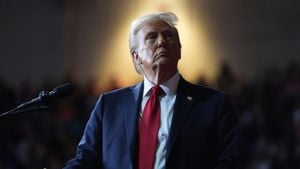Confidence filled the air as Mexican President Claudia Sheinbaum addressed the pressing concerns surrounding trade relations with the United States.
Just minutes after stepping off the phone with U.S. President-elect Donald Trump, Sheinbaum emphasized her belief on Thursday, November 28, 2024, "that a tariff war with the United States can be avoided.” Her remarks, delivered during her daily morning news briefing, hint at positive communication following the apprehensions expressed by many about potential economic tensions.
During the brief call with Trump, the content remained largely ambiguous. While Trump mentioned on social media later the same day of their talk, stating Sheinbaum had agreed to curtail unauthorized migration from Mexico, the specifics of any proposals or agreements remained hazy. Sheinbaum reiterated through her own social media accounts, asserting, "migrants and caravans are taken care of before they reach the border.” Yet, it remains unclear if this acknowledgment amounted to any promises or commitments.
Trump, who has previously threatened to impose hefty tariffs — at one point discussing 25% tariffs on goods imported from Mexico — sent ripples through trade circles with these declarations. His intentions to tighten control on both illegal immigration and the movement of narcotics such as fentanyl across borders have long been focal points of his administration's policies. But Sheinbaum's declaration provides hope for those wary of the ensuing conflicts tied to these threats.
Revisiting the past, Trump’s administration had implemented various tariffs targeting Mexican exports under the guise of national security and immigration control. These tariffs had previously impacted industries from agriculture to manufacturing, raising costs for consumers on both sides of the border. The specter of renewed threats has raised questions about the stability and trustworthiness of cross-border agreements.
Speaking on the broader diplomatic relationships, Sheinbaum's comments reflect her intention to restore dialogue and prevent escalation. "There will be no potential tariff war," she stated firmly, attempting to quell fears of impending economic fallout. With trade constituting one of the pillars of economic interaction between the two nations, it remains pivotal to navigate these discussions with care.
Former President Biden shared similar sentiments, emphasizing to reporters at his Nantucket residence, "I hope [Trump] rethinks it. I think it’s counterproductive—relationships with close allies should not be stressed over economic transactions.” Biden's remarks not only highlight the significance of U.S.-Mexico relations but also the strategic importance manufacturing and supply chains have when they’re based on cooperative measures.
Trump’s approach, centered around imposing tariffs until Mexico escalates measures against illegal immigration, paints an adversarial picture. This rhetoric often mirrors the strategies seen during heightened tension periods under his previous tenure. Conversely, Sheinbaum, swearing allegiance to diplomatic engagement and resolutions, positions herself as the voice striving to mend the fray now echoed between the two nations.
Historically, the conversation around migration has been multifaceted. Migrant caravans have become symbolic of humanitarian crises rather than mere socio-political nuisances. The caravans—groups of migrants often seeking refuge from violence and poverty—attract attention not just for their volume but for the international humanitarian discussions they ignite. Sheinbaum's remarks allude to the proactive measures already present against such migratory flows, reflecting Mexico's existing measures to manage the situation.
Experts posit the importance of cooperation over confrontation. The North American economy thrives on integrated supply chains where countries share resources and workforce pipelines. An unraveling of these friendships could lead to disastrous consequences not just economically, but also politically. Finding common ground and harmonious bilateral agreements is key.
While Sheinbaum's confidence speaks volumes within domestic platforms, it lands heavily on international trades and viewership. The fluctuations of the peso, adjustments to cross-border tariffs, and responses from businesses involved—a complex web of economic growth and sustainability—are worth watching as this story develops.
The scenarios projected stem from real-time balancing acts occurring between Trump’s ultimatums and Sheinbaum’s diplomatic ventures. Her confidence suggests she might emerge not just as a leader standing for Mexico but potentially as someone who could stabilize trade relations as new leadership dons the United States’ presidency come January 2025.
Even when dialogues around trade policies grow heated, the takeaway seems clearer than ever: cooperation remains the ultimate goal.
Future sessions between the two leaders will undoubtedly be monitored closely. World leaders and analysts alike will chance upon the aftermath of Sheinbaum's assurance and whether it transforms from mere declarations to tangible results fostering peace and mutual benefit.
— Associated Press contributed to this article.



